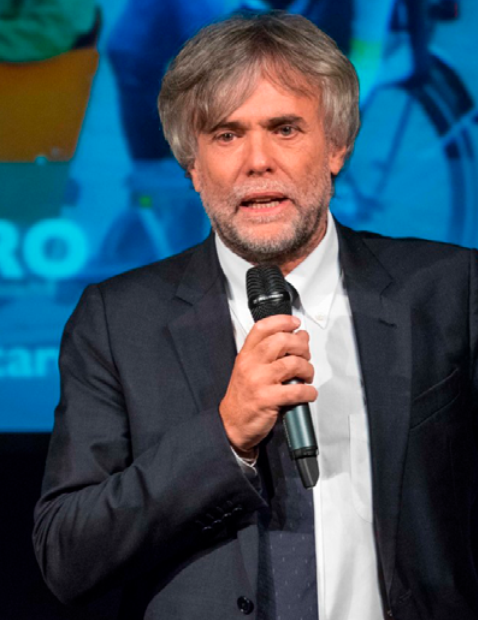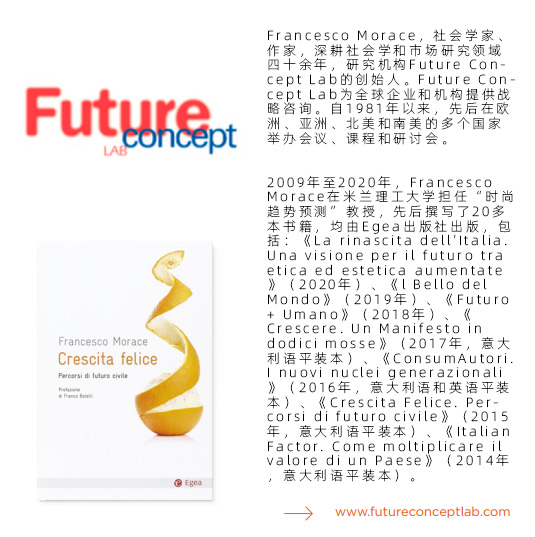此文章来自奥马冰箱绿皮书第1篇。
An eye-opening interview with Francesco Morace, founder of Future Concept Lab, about how to reconcile economic growth and the preservation of our planet.
此次我们采访了研究机构Future Concept Lab的创始人Francesco Morace,他就如何在经济增长和环境保护之间取得平衡表达了独到的见解。

“Degrowth theories correctly diagnosed the disease, but got the cure wrong”
“去增长理论诊对了病症,却开错了药方”
Q - How can we continue growing our economies and maintain our current consumption levels, without irremediably harming our planet?
问 - 如何才能在持续推动经济增长并维持现有消费水平的同时,避免对地球造成无法补救的伤害?
R - We all agree that our growth model over the past decades is not sustainable. In that, degrowth theorists had the correct intuition, but the cure they suggested is inapplicable. Stopping the development of world economies, and even de-scaling them, simply will not happen. Nobody is prepared to make radical concessions on their lifestyles. Being “against” industry in general, or multinationals, antagonising market economies, hasn’t produced the expected outcome and certainly didn’t win over the masses. We must think differently.
答 - 我们都知道,过去几十年的增长模式是不可持续的。在这一点上,去增长理论学家的直觉是正确的,但他们提出的方案并不可行。让世界经济停摆、甚至倒退,简直是天方夜谭。没有人愿意在现有生活方式方面做出让步。无差别地“抵制”工业、跨国公司和市场经济,并未产生预期效果,也没能赢得公众认可。我们必须换个角度思考问题。
Awareness about the issue has grown tremendously in our societies, especially in the younger generations. Our consumption habits are actually changing in the light of this increased sensitivity, and in a profound way but not in the sense of a radical reduction of our social metabolism. We are not consuming less, but differently. The way we go about purchasing a new appliance, for instance, has completely changed from only a few years back. The “Fridays for future”generation, the adults of tomorrow, is already a lot smarter and attentive in its buying decisions and is pushing the older generations into action. Industry, on its part, is quickly responding to this accelerating shift in demand towards environment-friendly products and services, not because of a new-found idealistic temperament, but because it makes good business sense. Moreover, reputation is an ever more important part of a company’s brand equity, and is now solidly linked to its sustainability stance.
在当代社会,人们——尤其是年轻人——对环境问题的认识水平大幅提升,由此驱动了消费习惯的深刻变革,但这并不会抑制社会经济正常运作。人们并没有减少消费,而是换了一种方式消费。就说新电器,如今的购买方式也已与几年前大不相同了。提倡“气候罢课运动”的年轻人,即未来社会的中坚力量,在购买决策方面已变得更加明智周全,并且正带动年长的人群参与到行动中来。消费者对环境友好型产品和服务的需求日益增长,制造业迅速对此作出响应,但不是出于理想主义的考量,而是为了赢取更高的商业利益。此外,声誉在企业品牌资产中的重要性日益凸显,而就目前来说,品牌声誉与品牌的可持续发展立场息息相关。
In 2016, Ulrich Beck, author of “The Metamorphosis of the World” (Polity Press, 2016) said that “climate change is transforming our concept of the world”. He also predicted that these changes in our societies would be perceived by multinationals before governments. He was right. Nowadays, while world governments still struggle to come to an agreement on the common goals to be pursued and translate them into national legislation, it is not uncommon to see large organisations include sustainability objectives, alongside financial and economic performance, in their mission statements. And the trend is on the upside.
2016年,Ulrich Beck在其著作《世界的蜕变》(英国政体出版社,2016年)中表示:“气候变化持续改变着人们对世界的看法。”他还预言跨国公司将先于政府感知到社会变化。千真万确。如今,各国政府还在着手制定共同发展目标,以便后续出台法规落实这些目标。但与此同时,众多大型企业已将可持续发展目标纳入企业使命,与财务和经济目标地位相当,而且越来越多的企业都在这样做。
“Digital saved exactly what it was accused of destroying: our social lives”
“数字化非但没有破坏社会生活,反而是社会生活的救星”
Q - You mention “smart” as part of the solution…
问 - 您在解决方案中提到了“智能化”……
R - Yes, and that’s the second part of the equation. Smart & Sustainable is the new paradigm for a growing world economy that also effectively addresses climate change, helping to preserve and restore our natural environment. I like to call it “happy growth” (Morace, Francesco, Crescita Felice, Egea, 2015) for it does away with a sense of guilt that was hindering the debate. The digital revolution has a key role to play here. Smart technologies, big data, smart cities and our connected societies allow for an unthinkable level of precision in monitoring consumer habits and market trends, providing predictive models that help reducing waste and consumption of energy and other resources. The same instruments also serve to optimise virtually every process in our economies, and can easily be oriented towards reaching CO2 reduction objectives.
R - 没错,这是实现平衡的第二大要素。智能化和可持续代表着全球经济增长的新模式。这种模式不仅能有效地应对气候变化,还有助于保护和修复自然环境。我称之为“愉悦的经济增长”(Francesco Morace,《Crescita Felice》,Egea出版社,2015年),因为这种增长模式消除了损害自然环境所带来的负疚感。在这个过程中,数字革命扮演着至关重要的角色。得益于智能技术、大数据、智慧城市和互联社会,我们对消费者习惯和市场趋势的监测日趋精准,由此构建出的预测模型可以有效减少浪费及能源和其他资源的消耗。这些模型还有助于优化经济活动的其他各环节,助力二氧化碳减排目标的实现。
Smart is also to be intended in a bottom up perspective, as a responsible attitude on the part of each and everyone of us. A lot can be achieved through virtuous and environmentally conscious individual behaviours, from recycling and reusing to a greater attention to what we eat, to personal mobility and to the many choices we constantly make in conducting our every day lives.
此外,每个人都应肩负起责任,自下而上地推进智能化。在做日常生活的各类决策时,应有意识地选择对环境更友好的行为。例如,加强回收利用、关注绿色饮食、改变出行方式等,从而为实现环保目标添砖加瓦。
The recent lockdown periods we were all forced into to varying degrees, have brought about profound changes in our behaviours over a relatively short period of time. In the recent past, such a rapid and radical transformation was absolutely unthinkable. For one thing, digital, which was accused of destroying our social lives prior to the pandemic, was the very instrument of our social salvation during the dark months of isolation.
近来,或长或短的居家隔离经历快速而彻底地转变了人们的行为模式。在此之前,没有人料到这种转变的速度之快、程度之深。值得一提的是,疫情爆发之前,有人指责数字化破坏了社会生活;可是在艰难的隔离时期,正是数字化为人们的生活提供保障。
Q - Nowadays we tend to shop less frequently, hence the need for larger fridges to store greater quantities of supplies. How does that affect our sustainability?
问 - 如今,人们倾向于降低购物频率,因此需要更大的冰箱来储存更多的物资。这对可持续目标有何影响?
R - There is no right or wrong here. Variety of behaviours is vital for our developed societies. We must be free to choose what suits us best, as long as we keep climate issues in mind. On one hand, bulk buying helps save on trips to the supermarket and optimise our shopping while reducing waste, but the opposite trend is increasingly significant: Shopping more frequently, privileging local, fresh and seasonal foods that aren’t mass produced nor excessively processed. A large part of these products get consumed on a daily basis, so they don’t need such big refrigerators, which in turn leads to savings on energy consumption, raw materials and transportation. Whatever the smart personal choices, industry has a key responsibility and a central role to play in providing the smart processes and products that will eventually help us reach our sustainability objectives and win the battle for the survival of our planet.
答 - 在这点上没有对错之分。行为多样性正是社会发展的主要推动力之一。在不影响气候的前提下,人们有权自由地选择最适合自己的生活方式。一次性购买大量物资可以省去往返超市的奔波,既能改善购物体验,又能减少能源和资源浪费;而提高购物频率,优先选择当地当季、未经过批量生产或过度加工的新鲜食材,也受到许多人的追捧。这种方式能减少能源和原材料消耗并降低运输成本。并且由于所购买的产品中有很大一部分是日常必需品,所以并不会占用太多的冰箱空间。无论人们为推进智能化做出了什么样的决策,整个产业链都有责任、有义务为消费者提供智能化工艺和产品,以最终实现可持续发展为目标并帮助地球赢得这场生存战。

版权归广东奥马冰箱有限公司所有,如需转载请注明出处。































